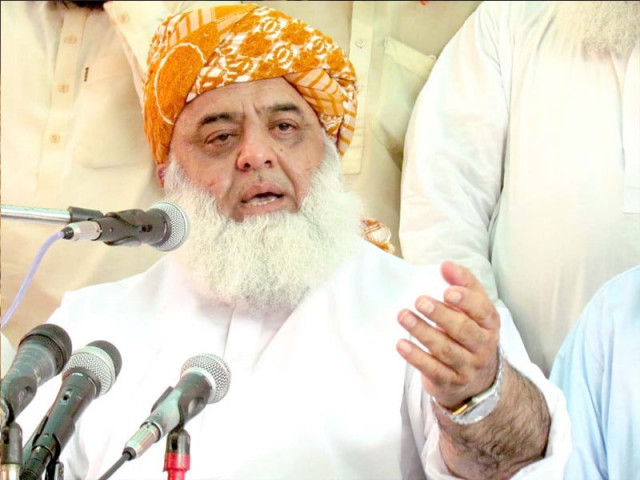Fazl rejects mala fide ordinance
JUI-F chief says govt package limited people's rights by expanding military role

Jamiat Ulema-e-Islam-Fazl (JUI-F) chief Maulana Fazlur Rehman said on Friday that issuing ordinance at the time when constitutional amendments were being debated was mala fide and his party rejected any such move.
Addressing a press conference at Madrasa Qasim Uloom Gilgasht in Multan, Fazl revealed that he opposed the proposed constitutional package because it expanded the military's role and limited the scope of people's fundamental rights.
Fazl was asked about his stance on the ordinance regarding the courts. "When the matter regarding the establishment of constitutional courts is in parliament, the ordinance has no status. The ordinances are malicious, he replied.
"It has been agreed in the meeting with [Pakistan Peoples Party (PPP) Chairman] Bilawal Bhutto [Zardari], that amendment drafts will be prepared. But if an ordinance has been issued, we will not accept it. No ordinance can be supported in the presence of parliament," he continued.
"The Peoples Party should fulfil its promise regarding the constitutional amendments and the establishment of constitutional courts. A constitutional amendments draft should be presented on which a consensus should be reached and brought to parliament," he added.
The JUI-F chief stated that his party did not recognise the current parliament but decided to continue "to play our constitutional role in parliament, whatever the situation is". Had this parliament played its due role, the people would not have suffered today, he added.
In response to another question, Fazl stated that the JUI-F would continue its role even of the government attained the two-thirds majority in the National Assembly following the speaker's letter to the Election Commission of Pakistan (ECP) on the reserved seats issue.
Dilating on the opposition to the government proposed constitutional amendments, Fazl said that the government was not willing to share the draft on the establishment of a constitutional court and wanted parliamentarians' support without any preparation.
The government announced that it would withdraw proposals to extend judges' tenures and increase in their numbers, rather, it would push for a federal constitutional court. For that the government sought the JUI-F's support on that," he told reporters.
"But we have told them that this is just a headline. First the draft of the bill be shown to us and then we will talk," Fazl told reporters, adding that the government was unwilling to share any draft concerning the establishment of the constitutional court.
"The government gave a copy to the Peoples Party. Finally one copy was given to us. [I] can't say for sure if both copies are the same. It is not known whether the new copy has some additions or deletion of some clauses," he said.
Continuing, the JUI-F chief said that the party's lawyers reviewed the draft and raised concerns that it expanded the military's role while restricting fundamental rights. "Therefore, we opposed it and rejected it," he said.
"The Constitution protects the rights of every citizen, but this constitutional amendment provides an exemption for the military. The exemption clause has been expanded and the human rights chapter in the Constitution has been limited," he said.
"The draft includes provisions regarding the appointment and transfer of judges which will greatly affect the system. There is even a reference to the high court judges that if a decision is not in [government's] favour, the judge could be transferred, or the case could be transferred to another judge."
Fazl lamented that "give-and-take among vested interests" had become the norm in the country's politics. "We pursued principled politics for the people," he said, "and rejected all suggestions that undermined human rights or prioritised protecting the government over delivering justice."
The JUI-F acknowledged the concept of a federal constitutional court was present in the Charter of Democracy with clarity. He referred to the reasoning of creating the court that dealt with the constitutional matters. In the Supreme Court at present, 60,000 cases were pending, he said.
"At the time the draft was given to us, the government did not have the majority to pass it [in parliament] and the passage of the draft was dependent on the JUI-F's support. "But the JUI clearly said that we are not satisfied and unable to approve this draft," Fazl told reporters.
Referring to his meeting with PPP Chairman Bilawal Bhutto Zardari in Islamabad earlier this week, Fazl said that both sides had agreed to prepare their own separate drafts of the constitutional amendments. He said that the JUI-F's draft would be ready in 10 days.
Fazl reiterated parliament's right to legislate and called for striking a balance of power among institutions. "This is our [parliamentarians'] job and we will not tolerate any restrictions," he said about enacting legislation.
"But if the balance of power among institutions is not maintained, the country will be harmed. Every institution should remain within its Constitutional scope. If an institution remains within its scope, it will work smoothly, otherwise the country will be weakened," he said.
Today, we see that when the establishment tries to gain power, influence elections, and install a government of their choice, the country weakens as a result. If institutions operate within their limits, the nation will grow stronger," Fazl stated.
In response to yet another question, he said that the JUI-F was not in a formal alliance with anyone. "We have links in both the government and the PTI [Pakistan Tehreek-e-Insaf]. We will move forward after having consultations on day-to-day issues," he added.
Fazl supported the demands of the relatives of the missing persons. "I demanded it in Meezan Chowk, Quetta. No one has any right to make someone disappear. We reject any proposals that affect human rights and independence of the judiciary."
(WITH INPUT FROM NEWS DESK)



















COMMENTS
Comments are moderated and generally will be posted if they are on-topic and not abusive.
For more information, please see our Comments FAQ